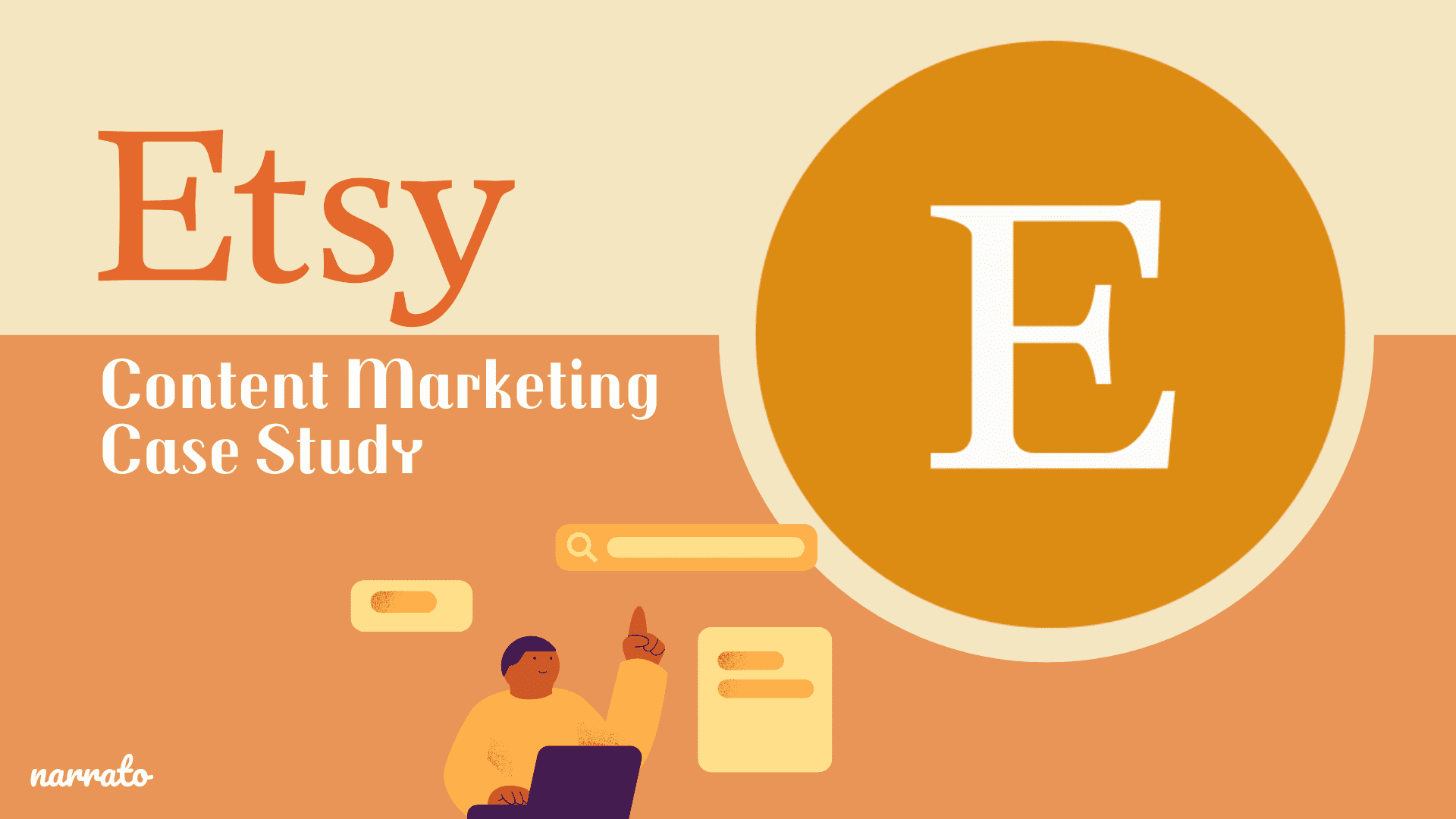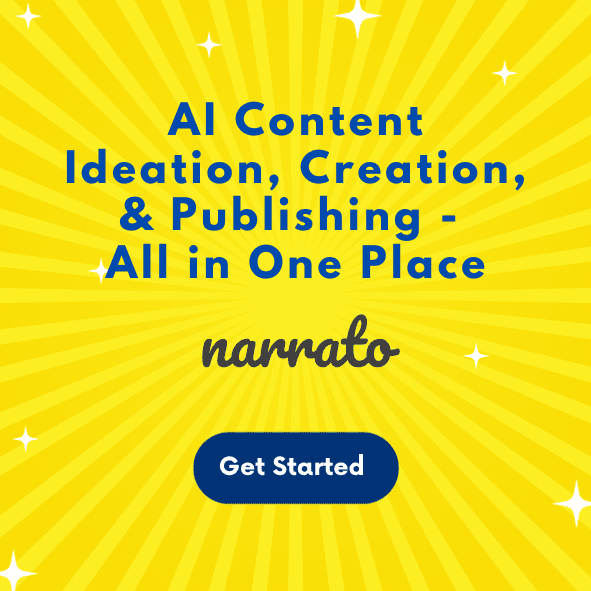Etsy Content Marketing Case Study: How This E-Commerce Company Built a Unique Brand Identity
We are witnessing a resurgence of artisanal goods in the e-commerce industry. And at the forefront of this resurgence was Etsy, a brand synonymous with creativity, craftsmanship, and community today.
Etsy is an e-commerce company that started as a small-scale virtual storefront for handicrafts way back in the 2000s. But it has now grown into one of the largest e-commerce marketplaces in the world, with over 93.9 million users. The phenomenal growth seen by this brand brings up some important questions –
- How did a handmade crafts store position itself in the highly competitive e-commerce industry?
- What did Etsy do differently with its content marketing strategy?
- What went into growing its large and devoted user base?
We’ll answer all these questions and more, in this ecommerce content marketing case study. Join us, as we uncover Etsy content marketing strategy, and dive deep into its e-commerce marketing plan. We will specifically look at the channels they leverage to strengthen their brand identity and drive more users to the platform.
TL;DR Here’s a quick video summarizing the Etsy content marketing case study
Role of content marketing at Etsy
Etsy Content Marketing Strategy
- Community building through Etsy Forum and Etsy Teams
- Etsy Journal
- Etsy’s unique approach to SEO
- Seller Handbook
- Etsy on social media
- Building a human connection through advertising
- Making the most of influencer marketing
- Etsy Affiliate Program
What we learned from Etsy content marketing strategy

About Etsy
Etsy is an online marketplace that connects millions of creative entrepreneurs with buyers interested in their handmade goods. Launched in 2005, with the aim to ‘keep commerce human’, this unique e-commerce company leveraged business and technology to support creative communities and empower people who wanted to sell their craft.
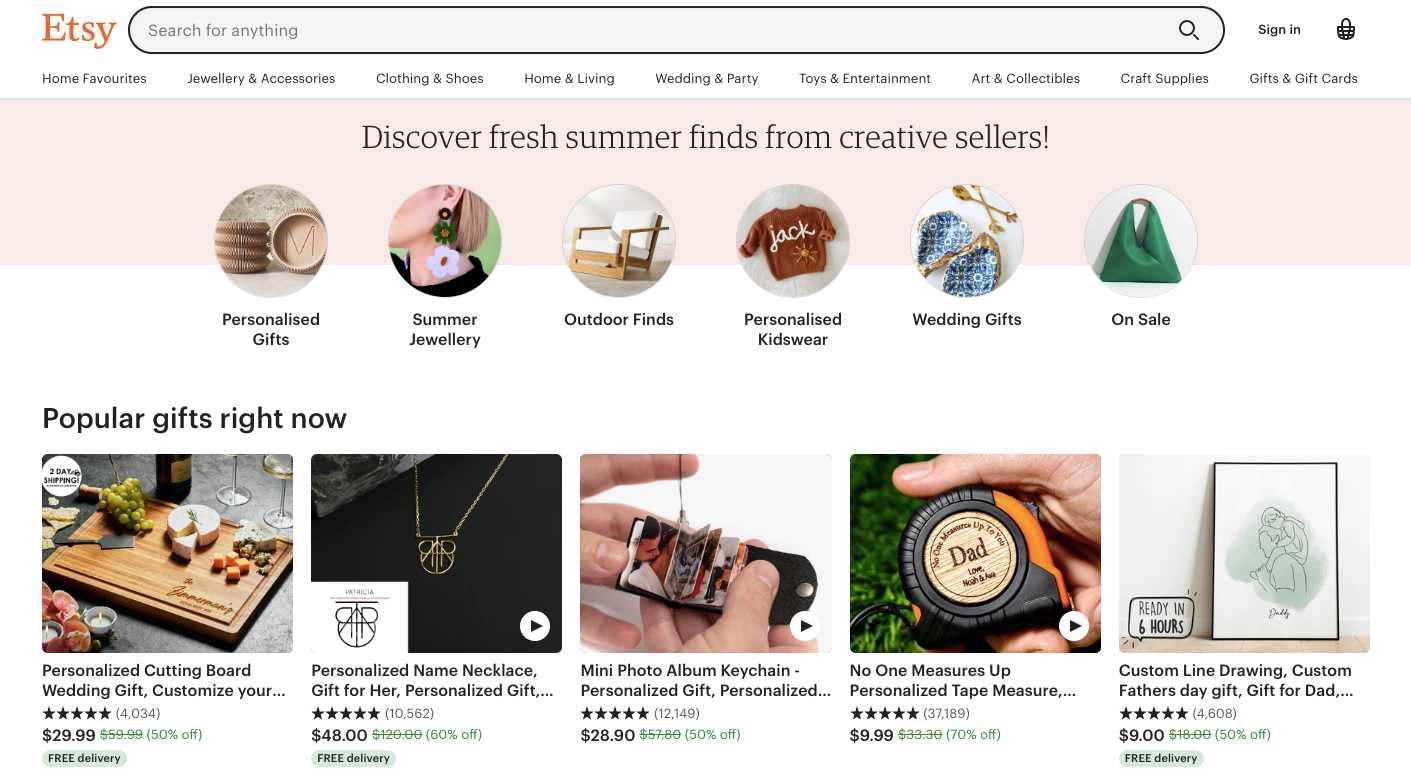
The idea for Etsy was born in a small Brooklyn apartment, when founders, Robert Kaling, Haim Schoppik, and Chris Maguire, decided to build a virtual storefront for arts and crafts products. Robert Kalin, who was making furniture items himself at the time, was looking for ways to sell his handcrafted creations. But finding takers for handmade items was a bit of a tough task. It was then that he came to the conclusion that a collective of sellers would attract greater attention from prospective buyers.
The first version of the Etsy store was developed in almost three months and launched soon after. And it gained a pretty good following within the first year. By 2007, Etsy had seen substantial growth, boasting approximately 450,000 registered ‘Etsians’, who collectively generated $26 million in annual sales that year.
The e-commerce brand maintained this momentum of growth in the ensuing years and grew into the global e-commerce giant that is known today. Numerous other brands, like Zibbet and Amazon Handmade, also took inspiration from Etsy’s success and launched their own marketplaces for creative entrepreneurs.
Role of content marketing at Etsy
Content marketing has been an integral part of Etsy’s success since its inception. Their marketing spending has also been steadily increasing over the years, from 39.66 million in 2014 to 710.4 million in 2022 (Source: Statista)

Through continuous efforts and strategic brand , Etsy has established that it’s not another e-commerce platform. It prides itself on being a community where artists can come together and make money from their creations. And the unique thing about this brand is that its community is closely involved in its ecommerce digital marketing strategy. Users are encouraged to contribute content, and the platform constantly comes out with guides to educate its users on SEO best practices to make the marketplace more search-friendly.
But besides user-generated content, Etsy also leverages several other digital marketing strategies, like –
- Social media marketing
- Advertising
- Blog marketing
- Affiliate marketing
- Video marketing
Let’s explore Etsy’s digital marketing and e-commerce advertising strategies in more detail.
Etsy Content Marketing Strategy
Etsy’s content marketing formula for success is simple: prioritize users above all else. Whether it’s their website resources, marketing campaigns, or SEO, all their content marketing efforts are built keeping in mind the needs and preferences of their users, both sellers and buyers.
1. Community building through Etsy Forum and Etsy Teams
Community building has been central to Etsy’s success, and the platform provides various avenues for fostering a sense of belonging and collaboration among its users. The best examples of Etsy’s community-building initiatives are Etsy Teams and the Etsy Forum.
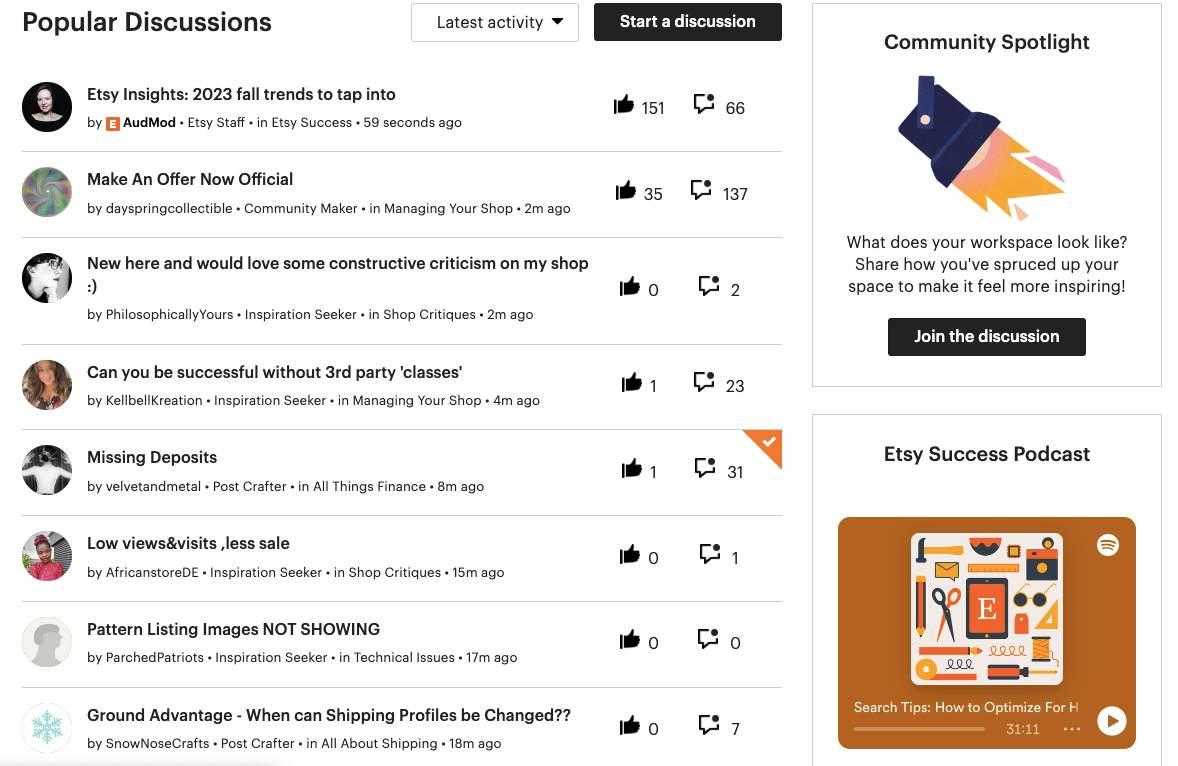
The Etsy Forum serves as an online space where Etsy sellers can engage in discussions, seek advice, and share experiences with one another. This dynamic and interactive space serves as an excellent resource, especially for sellers that are new to the platform.

Etsy Teams further strengthens the sense of community on the platform by allowing users with common interests, themes, or geographic locations to form specialized groups. It serves as a knowledge-sharing space, where sellers operating in the same niches can come together, share ideas, and start collaborations.
Through the Etsy Forum and Etsy Teams, the platform creates a thriving community that goes beyond mere transactions. It encourages interaction, collaboration, and exchange of ideas. And this, in turn, helps Etsy enhance the overall user experience. Additionally, it strengthens the brand’s identity as a platform that values creativity and the power of human connection.
Starting a forum on your e-commerce website is also a genius strategy to leverage user-generated content (UGC) to boost SEO. The presence of relevant keywords in forum posts naturally enhances the overall SEO value of the website.
Building a community and leveraging UGC through forums is a common marketing strategy observed in several industries. One such example is Marketo’s content marketing strategy in the SaaS space. Another instance can be found in the Pearler content marketing case study (fintech).
2. Etsy Journal
Etsy also has its own blog to balance out user-generated content. Aptly called the Etsy Journal, their blog is visually designed to resemble a scrapbook, with useful ideas, tips, and product recommendations.
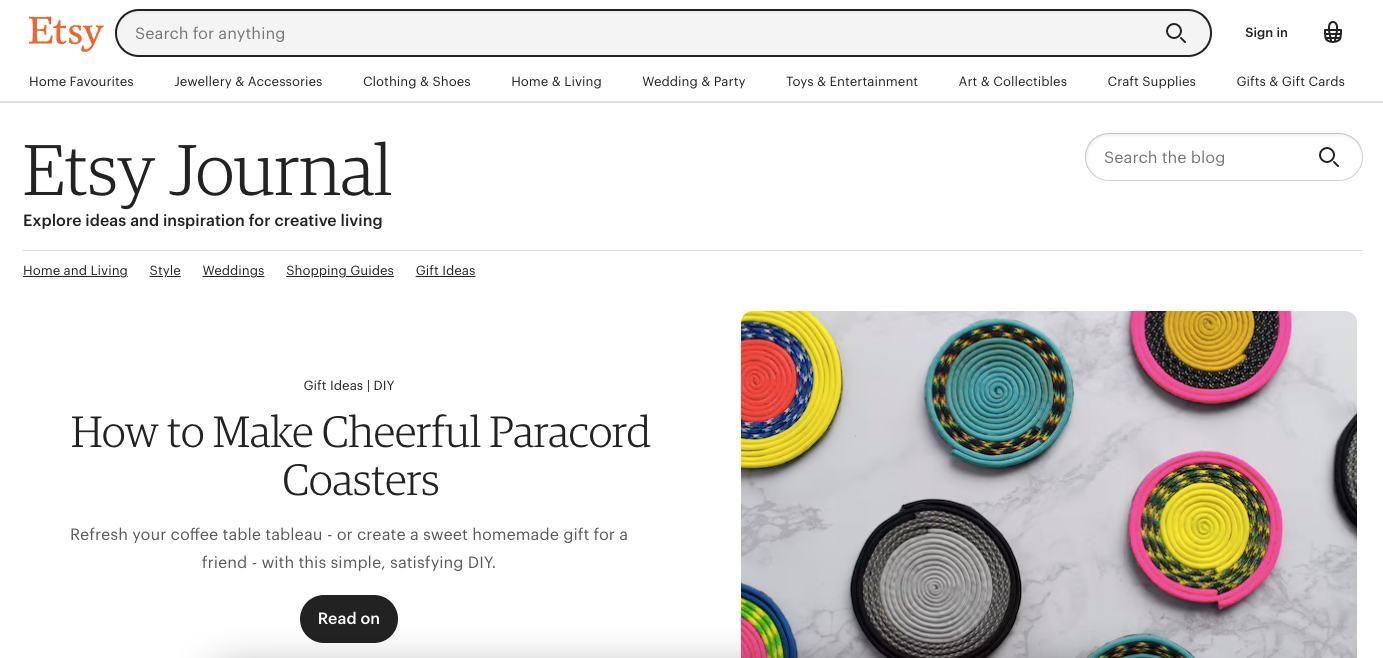
At first glance, it is evident that Etsy adopts an audience-centric approach to content. The blog heavily focuses on listicles, how-tos, and tutorial-type content, providing valuable suggestions and tips to buyers. It is also well-segmented, with five distinct categories of content their user base might be interested in –
- Home and Living
- Shopping Guides
- Style
- Gift Ideas
- Weddings
This strategy of audience segmentation is something we’ve seen in the ClickUp content marketing case study, and the one on HubSpot content marketing strategy.
Another way Etsy fosters audience engagement is through comments and discussions under blog posts. Readers can actively participate, leave feedback, ask questions, and share their experiences. This interactive element helps users form a stronger bond with the brand.
A unique aspect of the Etsy blog is Features Shops. These are blog posts highlighting and promoting standout shops from the seller community on Etsy.
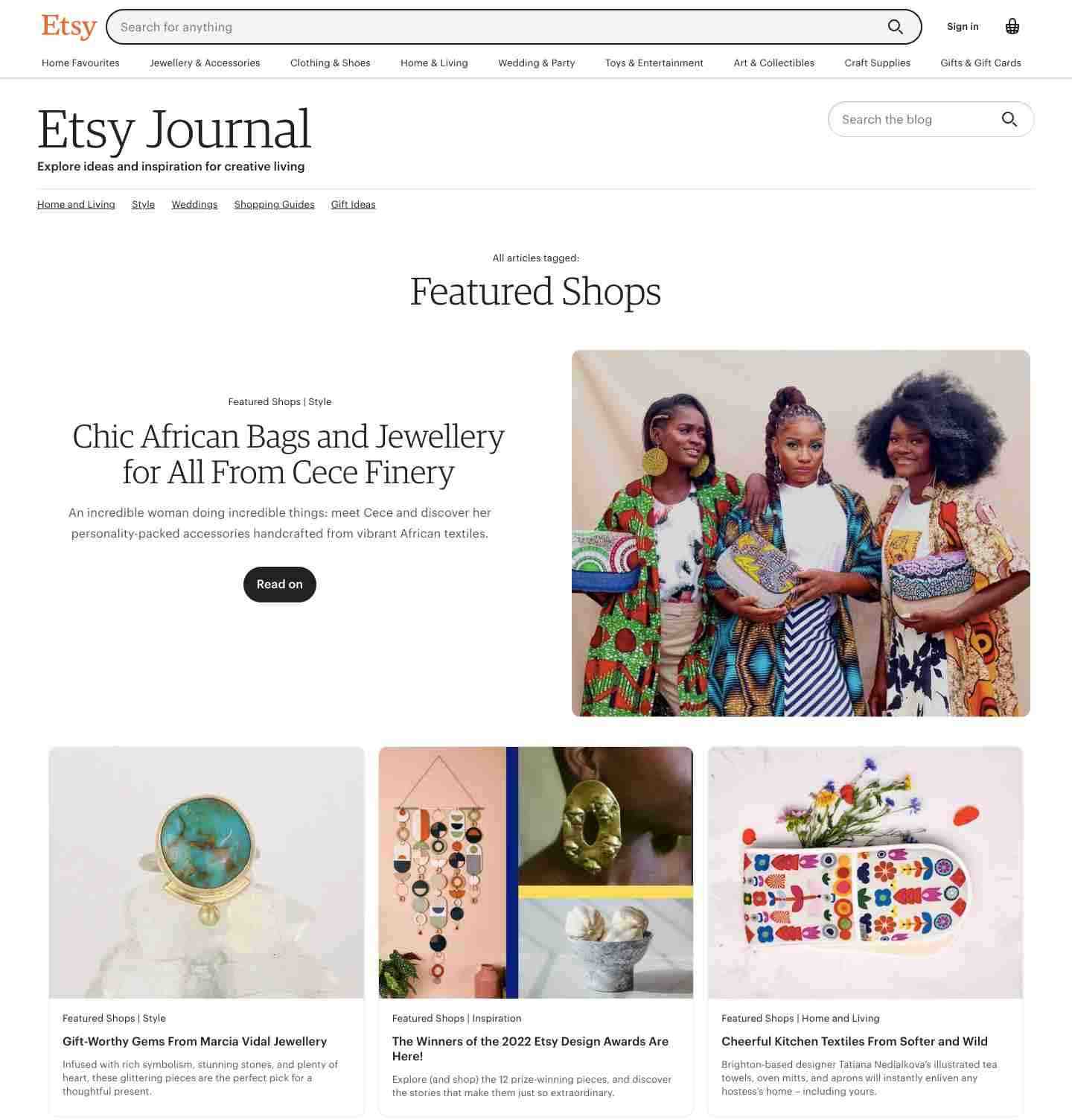
The purpose of these blog posts is to provide buyers with a behind-the-scenes look at a seller’s product. It gives the readers a chance to connect with the Etsy sellers on a more human level, as they get to learn their stories. And sellers, in turn, get to highlight their custom products and drive traffic to their Etsy product listings to make sales.
3. Etsy’s unique approach to SEO
When it comes to online marketing in e-commerce, SEO is a must-have for extending reach and connecting with a larger audience. But Etsy’s approach to content SEO is a little different. Unlike most major online platforms, Etsy’s SEO strategy doesn’t primarily revolve around blog content. Instead, they use circular internal linking with targeted keywords to direct visitors to different areas of the Etsy site.
The primary driver of traffic for this e-commerce store is the product pages, which are created and optimized by the sellers themselves. However, Etsy diligently assists its seller community in understanding and implementing effective SEO practices to run successful Etsy stores. More on that in the next section.
4. Seller Handbook
As we mentioned, the seller community is an integral part of Etsy’s ecommerce marketing plan. The platform leverages the contributions of its sellers to boost SEO and guides them in the process too. That’s what the Seller Handbook is there for.
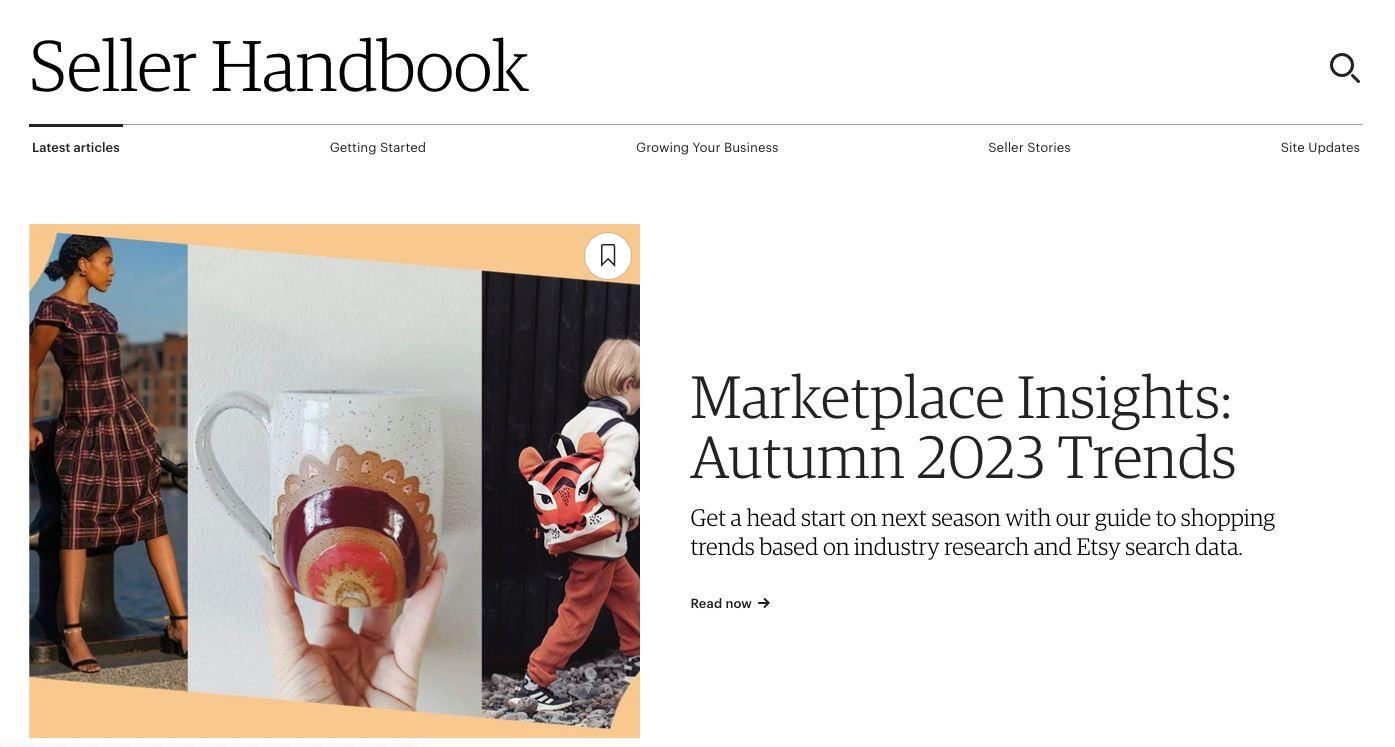
While Etsy Journal is a resource page targeted towards buyers, the Seller Handbook is made specifically for the seller community. As the name suggests, it’s a handbook that helps sellers in setting up their Etsy shop and optimizing it for search engines. The content on the page is educational in nature, with topics like –
- 5 Tips for Writing Listing Descriptions
- Customizing the Look of Your Shop Home
- Keywords 101: Everything You Need to Know
The Seller Handbook is well-categorized, with sections like ‘Getting Started’, ‘Growing Your Business’, and ‘Seller Stories’. Any updates or announcements regarding the site are also added here, under ‘Site Updates’.

5. Etsy on social media
Social media is a great channel for e-commerce businesses to connect with users, promote products and increase brand visibility. And Etsy has an active social media presence on all major platforms. In fact, it has two types of social media channels on all platforms – Etsy and Etsy Success.
The Etsy main-channel pages on Instagram, YouTube, and Twitter feature a lot of posts promoting seller items, along with some Pinterest-y posts and videos. The focus is heavily on visual content, with occasional memes and polls added into the mix. Most of the content is promotional in nature to get more buyers on the platform.
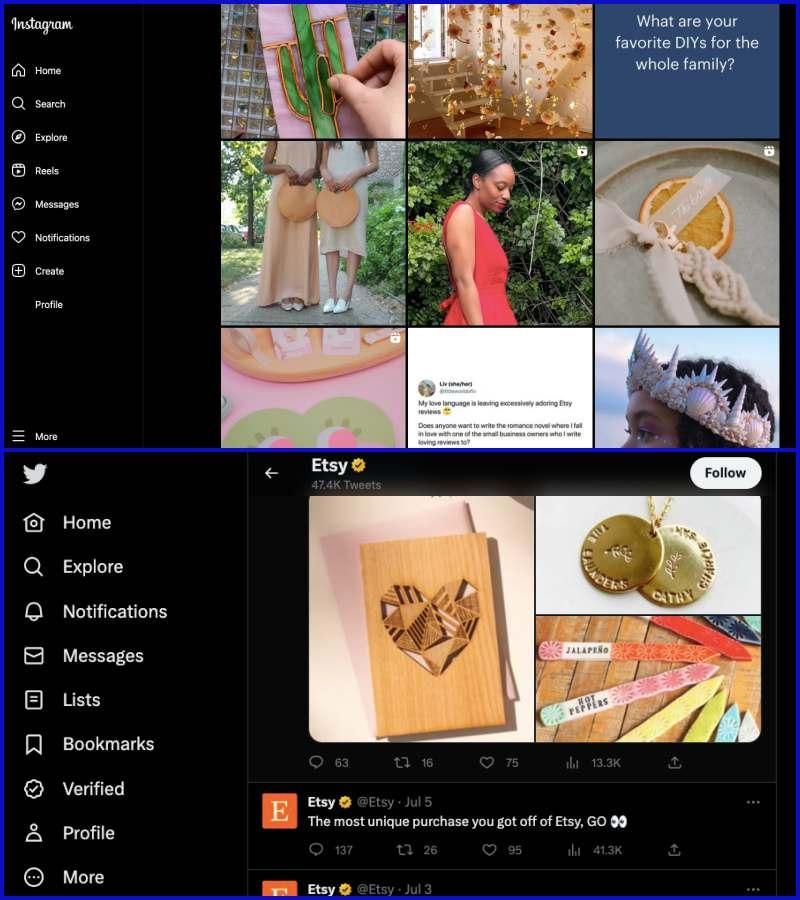
Their Pinterest page also contains a lot of arts and crafts posts. The social posts on this platform are strategically aimed at expanding brand visibility and reaching a wider audience (sellers, buyers, and anyone interested in arts and crafts).

Their LinkedIn page, on the other hand, gives a behind-the-curtain look at the Etsy team and shows what it is like to work in the company.

When you move on from Etsy’s main social channels to Etsy Success, you’ll find that it is entirely dedicated to direct-from-Etsy advice for sellers. There are four social media platforms that fall into this category: Instagram, Facebook, Twitter, and YouTube. Among these, Twitter is one channel they’re not currently active on.
Their content on YouTube is quite comprehensive, with video guides, how-to videos, top trends compilations, and seller success stories. The Etsy YouTube channel looks like the natural continuation of their Seller Handbook, giving people access to a wide variety of useful resources.

Most of their video content on YouTube is under 10 minutes, but there are some long-form videos for topics that require more in-depth exploration, like expert-led discussions and seller success stories.
The Etsy Success Instagram account is where the company posts content almost daily. You’ll find a lot of short-form content in the form of reels, which are often repurposed from YouTube videos.
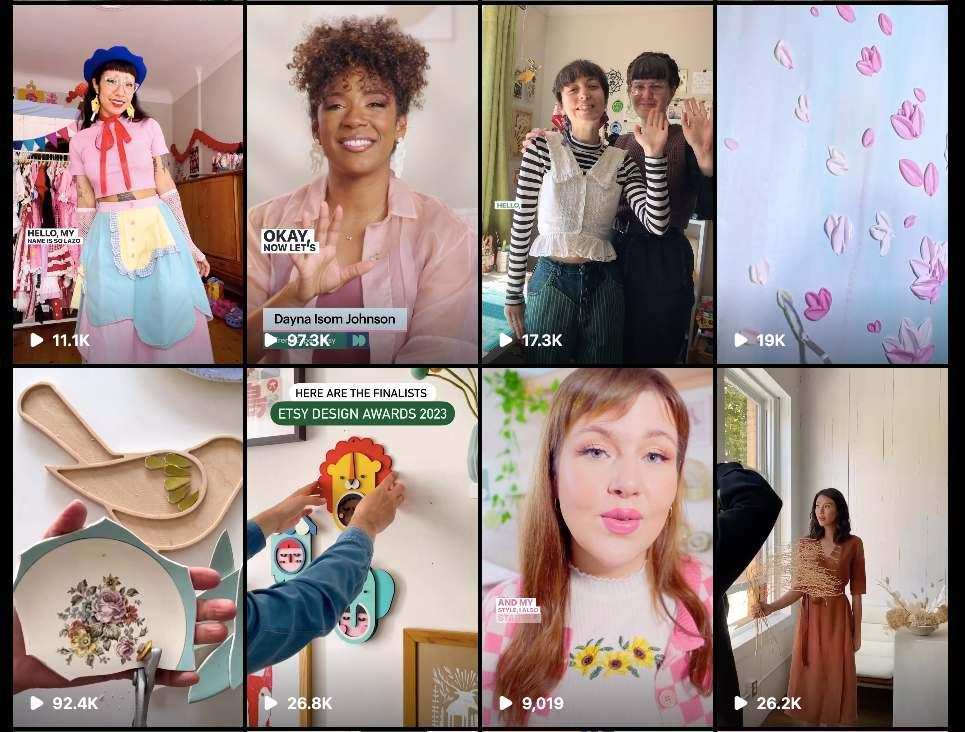
As for the Etsy Success Facebook content, it mostly features event announcements, expert tips-type video posts, and holiday-themes social posts.
As is evident, Etsy’s social media marketing strategy is platform specific. They take the time to understand what their user base would like to see on each platform and develop content accordingly. They do repurpose content sometimes, but you’ll find that most of the content for each social media platform is unique and tailor-made for that platform.
6. Building a human connection through advertising
With blog marketing and SEO, it can take time to build brand awareness and move prospects down the marketing funnel. Paid advertising and search, on the other hand, target your audience right away. Etsy understands the benefits of leveraging paid ads to grow its business, which is why it invested in various forms of advertising, like TV commercials, online videos, and paid social media ads.
One of the key strategies Etsy employs is creating inspirational ads that foster an emotional connection with viewers. These ads are designed to evoke positive feelings and reinforce Etsy’s core brand promise – “Keeping commerce human”
Here is an example of an ad campaign, titled ‘Etsy Has It’. This video shows how products on Etsy are made for the entire family.
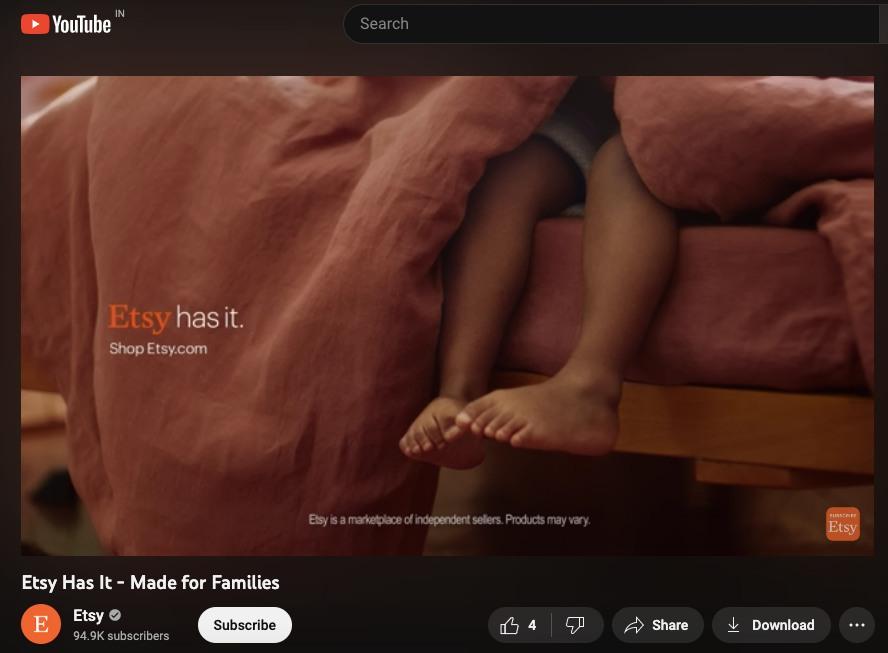
7. Making the most of influencer marketing
Etsy recognized early on that influencers have a strong impact on consumer behavior and decision-making. And so, the brand didn’t waste any time in developing its own influencer marketing strategy.
Etsy has partnered with several influencers till now, including Antoni Porowski, Trixie Mattel, and Ketya. Most of these influencers were people who aligned with their brand values and resonated with their target market. Here’s an example of an influencer marketing campaign, in which the brand roped in Antoni Porowski from Queer Eye to talk about Etsy’s Registry.

By collaborating with influencers, Etsy was able to extend its reach and connect with potential customers who may not have been aware of the platform otherwise.
Etsy has also started a dedicated program for social media content creators, called Etsy’s Creator Co. This works a lot like an affiliate program, through which creators get to earn a commission + Etsy perks for creating content promoting Etsy items.
8. Etsy Affiliate Program
Besides Etsy’s Creator Co, the e-commerce website also has its own affiliate marketing program, which rewards users for sharing items from the Etsy marketplace. They’ve also opened this affiliate marketing opportunity to their sellers. The Etsy Affiliate Program is for those with have a website or blog, while Etsy’s Creator Co is specifically for affiliates with a social media channel.

This is another genius move by Etsy as part of its e-commerce content marketing strategy. Affiliates can act as brand ambassadors for e-commerce businesses, influencing people’s purchase decisions through strategic product promotions. It can be a useful marketing strategy to grow your e-commerce presence. In fact, businesses in all verticals can leverage affiliate marketing, as was seen in our fintech content marketing case study on Chime.
What we learned from Etsy content marketing strategy
After closely examining Etsy’s remarkably successful e-commerce content marketing strategy, we’ve distilled a selection of key takeaways that could hold significant value for those seeking to enhance their own content marketing efforts –
- Add a dedicated forum on your e-commerce website to build a sense of community around your brand, and encourage collaboration and exchange of ideas among the sellers.
- Provide educational resources and guide for your seller community to help them optimize their product listings for search.
- Segment your blog content based on categories that align with your audience’s interests to provide targeted and relevant information.
- Create a comment section for your blog post to encourage audience engagement.
- Use circular in-links with targeted keywords to direct visitors to different pages of your e-commerce website.
- Show your brand’s human side on social media platforms to forge genuine connections with the audience.
- Paid ecommerce advertising is still relevant. Make sure that you create inspirational ads that evoke positive emotions and reinforce your brand vision.
Create killer content for your e-commerce website with Narrato AI
Etsy content marketing strategy serves as a remarkable blueprint for e-commerce business owners and marketers, illuminating the path to building a distinctive brand identity. If you want to emulate Etsy’s success and create better content for your e-commerce website, give Narrato AI a try. This AI content workspace offers a suite of tools, like AI SEO content brief generator, AI writer, and AI images, to help you create stellar e-commerce content that positions your business for growth. Whether it is blogs, social media posts, or website copy, Narrato can help you with all your content creation needs.
And if you’re a seller on any e-commerce marketplace, you might want to check out Narrato’s AI product description generator. This powerful AI tool enables you to effortlessly create SEO-friendly product descriptions in bulk, saving you valuable time and effort in the process.
With Narrato AI, you no longer have to rely on multiple tools to get the job done. Try it out for free today!


